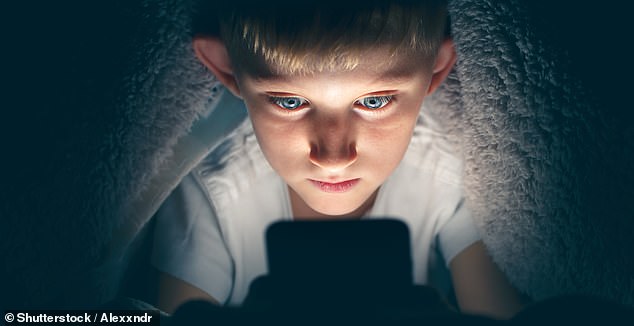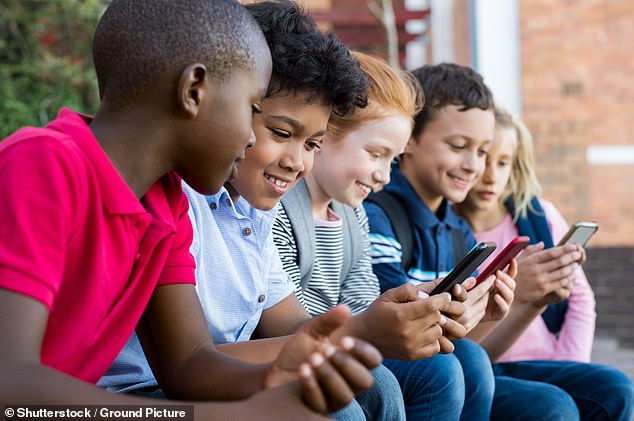What age SHOULD you give your child their first phone? Experts weigh in – with surprising results
>
Over the past two decades, a technological revolution has made accessing the internet an incredibly easy thing to do.
Its evolution from dial-up to Wi-Fi, and 3G to 5G, all improved accessibility, but arguably the biggest step-up was made with the proliferation of the smartphone.
As of 2023, 6.8 billion people have one, and as there are now just over eight billion people in the world, a significant proportion of smartphone owners are likely children.
With the good, bad and downright traumatising just a few taps away, experts have been discussing when it is appropriate to give a child their first phone – if ever.
As a result of their widespread usage, many experts have weighed in on when they think children should be given their first smartphone (stock image)

Chief inspector of Ofsted, Amanda Spielman (pictured), expressed her surprisal on hearing about primary and early secondary school children having mobile phones
This week, the chief inspector of education watchdog Ofsted suggested that children should not have unrestricted internet access or smartphones at a young age.
In a conversation with BBC Radio 5 Live about accessing explicit content online, Amanda Spielman said: ‘I’m not comfortable with younger children having unlimited internet access.
‘I’m very surprised when primary-aged children have smartphones, for example, and even in early secondary school. It’s really hard to manage that.’
Ms Spielman also suggested that it was the role of parents and schools to ‘make sure that children can steer past all of these undesirable influences’.
Data from Ofcom, the communications watchdog, found that 61 per cent – almost two thirds – of UK children own a smartphone by age 10.
The pandemic has also caused the average screen time of children aged three to 18 to shoot up by 50 per cent – with an average of four hours a day now spent on gadgets.
Children ranging in age from 12 to 18 showed the greatest screen time spike with an additional 110 minutes per day.
Researchers blamed the steep rise on the fact that most children in that age group have access to digital devices such as smartphones to use inside and outside of school settings.
People in that age range are already predisposed to spend a lot of their leisure time on screens where they maintain friendships and make social interactions.
Previous studies indicate excess screen time can cause physical eye and body strain, sleep deprivation, and impaired cognitive abilities.
Spending too much time on gadgets has also been linked to reduced physical activity and a rise in obesity, as well as lower self esteem and poor socialisation skills.
A study from San Diego State University revealed time spent on smartphones is a serious but avoidable cause of mental health issues.
Just an hour a day staring at a screen can be enough to make children as young as two years old more likely to be anxious or depressed.
Last year, researchers at the same institution also discovered that teenagers are lonelier at school now than 20 years ago because smartphones stop them talking with friends.
Pupils in the UK are ‘conversing less’ and feeling excluded when they see online pictures of peers having fun without them.

A study found that teenagers are lonelier at school now than 20 years ago because smartphones stop them talking with friends. Pupils in the UK are ‘conversing less’ and feeling excluded when they see online pictures of peers having fun without them (stock image)
What’s more, research from the National Institute of Health in the US has found that children who spend excessive time using smartphone have different brain structures.
Nine and ten-year-olds who use screens for seven hours or more a day showed signs that their brain cortex is thinning prematurely.
The brain cortex is the outermost layer of neural tissue that processes information from the physical world.
It is critical for cognitive functions such as perception, language, memory and consciousness but thins as we mature into old age.

An image of a brain while a child performs a working memory task, released by ABCD researchers. The regions in yellow and red are most active. Modern technology like smartphones, tablets and video games are physically changing children’s brains
As a result of widespread usage and their associations with poor mental and physical health, many experts have weighed in on when they think children should be first exposed to smartphones.
In November, the Children’s Commissioner, Dame Rachel de Souza should parents should resist buying their children a smartphone completely.
She told the Sunday Telegraph: ‘I think parents should think long and hard about monitored access to social media or actually access to social media at all.
‘I honestly think that we will look back in 20 years’ time and be absolutely horrified by what we allowed our children to be exposed to.’
But other experts do not feel such an extreme response is necessary.
The Vice Chairman of the Royal College of Psychologists thinks that smartphones are a feasible tool for children but only after they have joined secondary school at age 11.
Dr Jon Goldin claimed parents are being forced into buying the devices for their young children so they aren’t left out at school.
Speaking to the Daily Telegraph, he said: ‘Children often say to their parents: “All my friends are [getting phones] and you are not allowing me to do that.”
‘In that situation, parents do need the support of national guidance.’
It’s not only experts, but a number of celebrities have also revealed their thoughts about providing their children with smartphones.
In 2017, Microsoft founder Bill Gates said that he did not permit his children to own a mobile phone until they turned 14.
Despite the irony of the his pivotal role in the technological revolution of the digital age, Mr Gates still thinks limits need to be in place for children.
‘We often set a time after which there is no screen time and in their case that helps them get to sleep at a reasonable hour,’ the tech titan told The Mirror.
‘You’re always looking at how it can be used in a great way – homework and staying in touch with friends – and also where it has gotten to excess.’
Last year, Cristiano Ronaldo said that he hasn’t given his 11-year-old son a mobile phone yet.
The footballing legend said that he doesn’t want Cristiano Jr to become ‘obsessed with technology’ at an early age after picking up the Globe Soccer’s Top Scorer of All Time award.

Last year, Cristiano Ronaldo (right) said that he hasn’t given his 11-year-old son a mobile phone yet. The footballing legend said that he doesn’t want Cristiano Jr (left) to become ‘obsessed with technology’ at an early age

In 2017, Microsoft founder Bill Gates said that he did not permit his children to own a mobile phone until they turned 14 . Pictured: Mr Gates (second from left), his ex wife Melinda (left), daughter Jennifer (centre), daughter Phoebe (second from right) and son Rory (right)
However, not all experts feel that smartphones are detrimental to children – in fact, a lot of the time they say the opposite.
Researchers from Duke University in North Carolina, USA said that teens who are sociable in the ‘real world’ tend to reinforce and improve those relationships online.
‘Each generation worries about how young people are using their time,’ said Dr Candice Odgers, the associate director of the Duke Center for Child and Family Policy.
‘We see young people constantly on their phones and assume ill effects, but much of the research to date tells a more positive story.’
A study last year from the Stanford University School of Medicine ruled that the age that kids acquire mobile phones is not linked to their well-being.
They recorded school grades, sleep quality and any depressive symptoms of 263 children who acquired phones at different ages over a five year period.
Lead author, Dr Xiaoran Sun, said: ‘There doesn’t seem to be a golden rule about waiting until eighth grade or a certain age.’
But ‘if parents want to delay, we didn’t see negative effects of that, either,’ added senior author Dr Thomas Robinson.

Researchers from Duke University in North Carolina, USA said that teens who are sociable in the ‘real world’ tend to reinforce and improve those relationships online (stock image)
Children and teenagers can also use the breadth of information at their fingertips to their benefit.
A 2019 study by UNICEF found that children who use the internet more have better digital skills, which can guide them towards educational online experiences.
Research lead Daniel Kardefelt-Winther said: ‘If parents are too restrictive, this might leave their children unprepared for the future.
‘The most important thing is that adults are available and ready to support children when they need it.’
Children and adolescents can specifically use the internet to find information about their health privately and without fear of embarrassment.
Researchers from the University at Buffalo in New York reviewed published literature that investigated how young people use the internet for health information.
The authors wrote: ‘Depending on the population and disease concerned, most young people have used the internet for health-related purposes, and it represents their most frequent source of information.
‘Among healthy adolescents, this information includes sensitive topics such as sexual health and violence, as well as less sensitive topics such as exercise and nutrition.
‘For those who have been diagnosed with a medical condition, the topics searched also include finding treatment options, seeking support, and networking with fellow sufferers, which is consistent with other populations.’
Smartphone ownership among children can also benefit parents, as it can boost communication between them.
Dr Odgers told BBC Future: ‘If you actually analyse who kids are talking to online […] there’s a very strong overlap with their offline network.
‘I think this whole idea that we’re losing a kid in isolation to the phone – for some kids, that can be a real risk – but for the vast majority of kids, they’re connecting, they’re sharing, they’re co-viewing.
A study by the University of Southern Denmark found that smartphones can enrich a child’s time outdoors as it boosted their sense of security.
Participating children cited being able to use it to navigate unfamiliar areas as well as providing a line of communication to their parents as reasons for this.
These days, parents are also able to keep tabs on their child’s whereabouts without even contacting them, through apps like ‘Find My Friends’.
The authors said that a phone helped to ‘control the children’s what-if mentality, ultimately enhancing their independent freedom to roam and do things outdoors’.
Some experts say that it is not a question of a child’s age, but their maturity level, which varies between individuals.
Dr Gemma Stevens, a psychology lecturer at Robert Gordon University in Aberdeen, told The Press and Journal: ‘Children of a certain age are unable to self-regulate, and need their parents’ guidance.’
Online child safety expert Annabel Turner said that even delaying giving a child a smartphone for six months can allow for a significant boost in development.
She told The Press and Journal: ‘Every six months your child gains a massive amount of maturity, psychologically speaking, to be able to deal with stuff.’
Dr Stevens said that children are more susceptible to social comparison, which is exacerbated by the polished and filtered lives visible on social media.
‘You’ve got people using filters to improve their appearance. You’ve got celebrities where all the pictures are edited or photoshopped,’ she told The Press and Journal.
‘And that gives an unrealistic notion of what one should look like. That sort of thing has a real impact on self-esteem.’
